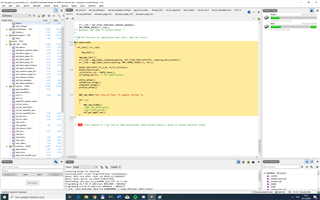Hi,
I am working with ANT bpwr tx profile and trying to implement HX711 and TWI sensor to it. TWI sensor is already working, but when I add library for HX711 from Vidar Berg and start sampling HX711, the ant transmission looks like it stops transmitting, or lose all packets. I can see it in AntWare II, that when hx711_start(false) function is called, AntWare can not see any transmitting device and i can see data from hx711 printing in debug terminal, but when I comment this function and let it how it was before, AntWare II can see the device and is able to receive data, so i know, that there is some conflict between hx711 data sampling and ant+ data transmission, but the project compiles succesfull. Do somebody know, what might be the problem?
using nRF52832, SDK15.2, Segger embedded studio, and library written by Vidar
thanks in advance
/******************************************************************************/
/* */
/******************************************************************************/
#include <stdint.h>
#include <string.h>
#include "hx711.h"
#include "nrf_drv_gpiote.h"
#include "app_util_platform.h"
#include "boards.h"
#include "nrf_delay.h"
#define NRF_LOG_MODULE_NAME hx711
#if HX711_CONFIG_LOG_ENABLED
#define NRF_LOG_LEVEL HX711_CONFIG_LOG_LEVEL
#define NRF_LOG_INFO_COLOR HX711_CONFIG_INFO_COLOR
#define NRF_LOG_DEBUG_COLOR HX711_CONFIG_DEBUG_COLOR
#else // HX711_CONFIG_LOG_ENABLED
#define NRF_LOG_LEVEL 0
#endif // HX711_CONFIG_LOG_ENABLED
#include "nrf_log.h"
NRF_LOG_MODULE_REGISTER();
/* Defines frequency and duty cycle for clock signal - default: 1 MHz 50%*/
#define TIMER_COUNTERTOP 32
#define TIMER_COMPARE 16
// Pinout
#define PD_SCK 23
#define DOUT 24
#define VDD 25 // Note: Depending on design, GPIO may not be able to source enough current for hx711 and loadcell.
/* HX711 ADC resolution in bits */
#define ADC_RES 24
typedef struct
{
uint32_t value; // buffer for ADC read
uint8_t count; // number of bitshifts. Read complete when count == ADC_RES
}hx711_sample_t;
static volatile hx711_sample_t m_sample;
static hx711_event_handler_t m_evt_handler;
static uint32_t m_mode;
static bool m_continous_sampling;
static int convert_sample(uint32_t sample)
{
return (int)(sample << 8) >> 8;
}
/* Clocks out HX711 result - if readout fails consistently, try to increase the clock period and/or enable compiler optimization */
static void hx711_sample()
{
NRF_TIMER2->TASKS_CLEAR = 1;
m_sample.count = 0;
m_sample.value = 0;
NRF_TIMER1->TASKS_START = 1; // Starts clock signal on PD_SCK
for (uint32_t i=0; i < ADC_RES; i++)
{
do
{
/* NRF_TIMER->CC[1] contains number of clock cycles.*/
NRF_TIMER2->TASKS_CAPTURE[1] = 1;
if (NRF_TIMER2->CC[1] >= ADC_RES) goto EXIT; // Readout not in sync with PD_CLK. Abort and notify error.
}
while(NRF_TIMER1->EVENTS_COMPARE[0] == 0);
NRF_TIMER1->EVENTS_COMPARE[0] = 0;
m_sample.value |= (nrf_gpio_pin_read(DOUT) << (23 - i));
m_sample.count++;
}
EXIT:
if (!m_continous_sampling)
{
NRF_GPIOTE->TASKS_SET[1] = 1; // HX711 power-down
}
NRF_LOG_INFO("Number of bits : %d", m_sample.count);
NRF_LOG_INFO("ADC val: 0x%x", m_sample.value);
if (m_sample.count == ADC_RES)
{
// Send notification with raw ADC value
m_evt_handler(DATA_READY, convert_sample(m_sample.value));
}
else
{
// Notify readout error
m_evt_handler(DATA_ERROR, m_sample.value);
}
}
static void gpiote_evt_handler(nrf_drv_gpiote_pin_t pin, nrf_gpiote_polarity_t action)
{
nrf_drv_gpiote_in_event_disable(DOUT);
hx711_sample();
if (m_continous_sampling)
{
nrf_drv_gpiote_in_event_enable(DOUT, true);
}
}
void hx711_init(hx711_mode_t mode, hx711_event_handler_t evt_handler)
{
ret_code_t ret_code;
nrf_drv_gpiote_in_config_t gpiote_config = GPIOTE_CONFIG_IN_SENSE_HITOLO(false);
m_evt_handler = evt_handler;
m_mode = mode;
nrf_gpio_cfg_output(PD_SCK);
nrf_gpio_pin_set(PD_SCK);
nrf_gpio_cfg(VDD,
NRF_GPIO_PIN_DIR_OUTPUT,
NRF_GPIO_PIN_INPUT_DISCONNECT,
NRF_GPIO_PIN_PULLUP,
NRF_GPIO_PIN_S0H1,
NRF_GPIO_PIN_NOSENSE);
nrf_gpio_pin_set(VDD);
nrf_gpio_cfg_input(DOUT, NRF_GPIO_PIN_NOPULL);
if (!nrf_drv_gpiote_is_init())
{
ret_code = nrf_drv_gpiote_init();
APP_ERROR_CHECK(ret_code);
}
ret_code = nrf_drv_gpiote_in_init(DOUT, &gpiote_config, gpiote_evt_handler);
APP_ERROR_CHECK(ret_code);
/* Set up timers, gpiote, and ppi for clock signal generation*/
NRF_TIMER1->CC[0] = 1;
NRF_TIMER1->CC[1] = TIMER_COMPARE;
NRF_TIMER1->CC[2] = TIMER_COUNTERTOP;
NRF_TIMER1->SHORTS = (uint32_t) (1 << 2); //COMPARE2_CLEAR
NRF_TIMER1->PRESCALER = 0;
NRF_TIMER2->CC[0] = m_mode;
NRF_TIMER2->MODE = 2;
NRF_GPIOTE->CONFIG[1] = (uint32_t) (3 | (PD_SCK << 8) | (1 << 16) | (1 << 20));
NRF_PPI->CH[0].EEP = (uint32_t) &NRF_TIMER1->EVENTS_COMPARE[0];
NRF_PPI->CH[0].TEP = (uint32_t) &NRF_GPIOTE->TASKS_SET[1];
NRF_PPI->CH[1].EEP = (uint32_t) &NRF_TIMER1->EVENTS_COMPARE[1];
NRF_PPI->CH[1].TEP = (uint32_t) &NRF_GPIOTE->TASKS_CLR[1];
NRF_PPI->FORK[1].TEP = (uint32_t) &NRF_TIMER2->TASKS_COUNT; // Increment on falling edge
NRF_PPI->CH[2].EEP = (uint32_t) &NRF_TIMER2->EVENTS_COMPARE[0];
NRF_PPI->CH[2].TEP = (uint32_t) &NRF_TIMER1->TASKS_SHUTDOWN;
NRF_PPI->CHEN = 7;
}
void hx711_power_down()
{
nrf_gpio_cfg_default(VDD);
nrf_gpio_cfg_default(PD_SCK);
nrf_gpio_cfg_default(DOUT);
}
void hx711_start(bool single)
{
m_continous_sampling = !single;
NRF_LOG_INFO("Start sampling");
NRF_GPIOTE->TASKS_CLR[1] = 1;
// Generates interrupt when new sampling is available.
nrf_drv_gpiote_in_event_enable(DOUT, true);
}
void hx711_stop()
{
nrf_drv_gpiote_in_event_disable(DOUT);
NRF_GPIOTE->TASKS_SET[1] = 1; // Must be kept high for >60 us to power down HX711
}



